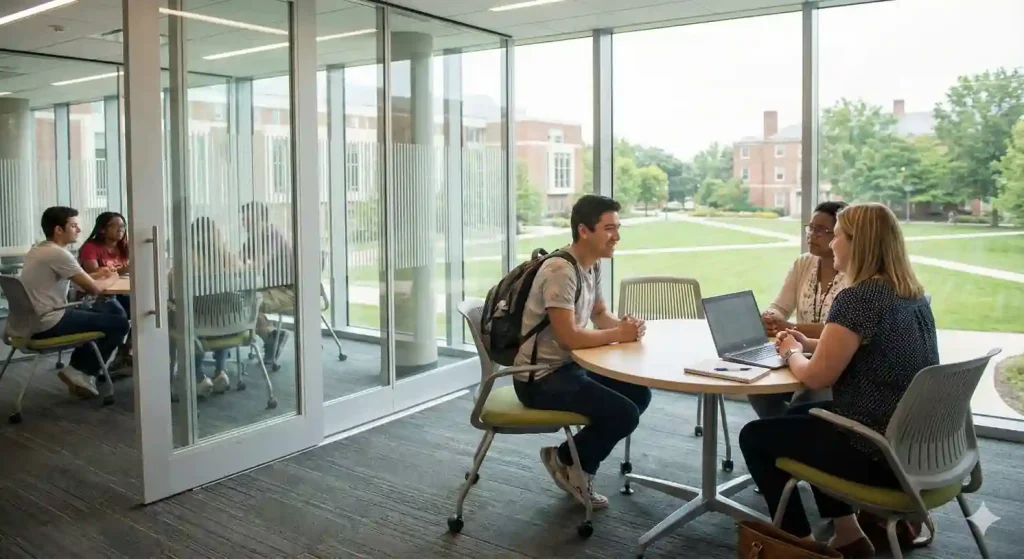For University CFOs, Bursars, and accounting teams, 2026 has introduced a perfect storm of financial pressure. Recent sector analysis reveals that nearly 45% of higher education institutions are facing operational deficits in the 2025–2026 academic year. With the national student debt burden exceeding $1.54 trillion, the challenge isn’t just “collecting money”—it’s maintaining institutional liquidity while fulfilling an educational mission.
The most significant hurdle today is the July 2024 Department of Education ban on transcript withholding. Historically, withholding transcripts was the primary tool for encouraging students to resolve their balances. With that lever removed for all Title IV-funded terms, many institutions have seen their “aged student receivables” swell.
At NexaCollect, we don’t view delinquent accounts as “bad debt.” We view them as interrupted enrollment. Our 4-step “Waterfall” model is designed to function as a seamless extension of your Bursar’s office, protecting your reputation while utilizing professional recovery mechanics.
The Higher Ed Revenue Waterfall: A 4-Step Solution
University accounting teams are often short-staffed and wary of the PR risks associated with traditional collections. Our phased approach minimizes friction and prioritizes the student-university relationship.
Step 1: The “Financial Counseling” Phase (Fixed Fee ~$15)
The first 60–90 days are critical. Our initial outreach is performed in your institution’s name.
-
The Strategy: We frame the contact as an administrative nudge or a “Financial Aid Opportunity.” Our team works to identify if the student simply missed a FAFSA filing or requires a Financial Aid Appeal due to a change in family circumstances.
-
The Benefit: You keep 100% of the funds recovered. Payments go directly to your student information system (SIS), ensuring no delay in updating the student’s status.
Step 2: Formal Agency Transition (Fixed Fee ~$15)
If the student remains unresponsive, the account transitions to NexaCollect’s name. This shift signals a formal boundary: the internal billing grace period has ended. However, the tone remains professional and diplomatic, serving as a “wake-up call” before any impact on the student’s credit profile.
Step 3: Intensive Recovery (40% Contingency)
For students who have permanently withdrawn or become “inactive,” our specialists initiate intensive recovery. We utilize advanced skip-tracing to locate graduates and former students who have relocated.
-
No Risk: This tier operates on a “No Recovery, No Fee“ basis. We take on the operational cost of finding and negotiating with the debtor; you only pay a percentage of what is actually returned to your coffers.
Step 4: Legal Review & Resolution
For high-value tuition defaults—particularly common in professional schools (Law, Medicine, MBA)—we offer attorney-vetted escalation. This ensures that substantial financial losses are pursued through formal legal channels to obtain a judgment, protecting the institution’s fiscal integrity.
The ROI of Retention: Converting Debtors into Students
A student who drops out due to a $2,000 balance is a loss of potential tuition revenue for the next three years. At NexaCollect, we use the recovery process as a re-enrollment engine.
Statistics show that students who complete their FAFSA are 84% more likely to enroll immediately. Our collectors are trained to guide inactive students through their Federal Student Aid documentation. We educate them on the “financial cliff”: dropping out makes them 100% liable for the debt, whereas re-enrolling may unlock Pell Grants or subsidized loans that cover 90% of the balance.
Student debt is often a “gold” asset for collectors. Unlike a car that depreciates, a graduate’s earning potential typically grows as they establish their career. Our long-term recovery approach is designed to help you recover balances over time—so as your alumni succeed, your institution is ultimately made whole.
We specialize in student accounts, and we’re ready for them—send them our way.
Bulletproof Compliance: FERPA, HIPAA, & TCPA
Higher education is one of the most heavily regulated sectors in the United States. A single PR mistake or a FERPA (Family Educational Rights and Privacy Act) violation can lead to a federal audit or a devastating hit to your recruitment numbers.
We safeguard your university with:
-
FERPA & HIPAA Literacy: Total confidentiality for educational and medical billing records from campus health centers.
-
TCPA & FDCPA Compliance: Rigorous adherence to communication laws to prevent lawsuits and institutional liability.
-
50-State Licensing: We can legally pursue and resolve debts across all 50 states, crucial for students who move after leaving your campus.
-
4.85-Star Google Rating: We are the only agency in the industry with a reputation verified by the people we collect from. We treat your students with the dignity that keeps your institution’s name out of the headlines.
The Bursar’s “Retention-First” Template
University accountants often struggle to find the right balance between “firm” and “helpful.” This template, used during Step 1, is designed to bridge that gap.
| Subject: Important: Your Enrollment Status & Financial Aid Options Dear [Student Name], Our records at [University Name] indicate an outstanding balance of $[Amount] for the [Term] semester. We want to ensure you are able to continue your academic journey without interruption. Have you finalized your FAFSA? Many students are eligible for grants or aid that can resolve this balance entirely. Please visit StudentAid.gov immediately to check your status. Please remit payment or contact the Financial Aid Office by [Date] to ensure your registration for the upcoming term remains secure. We are here to help you find a path forward. Sincerely, [University Billing / NexaCollect on behalf of University Name] |
Don’t let your aging receivables become a budget deficit. Once a tuition account passes the 90-day mark, the probability of a full recovery drops to 69%. By the one-year mark, it falls below 30%. Moving early and diplomatically is the only way to protect your institution’s cash flow while honoring its mission to the student.
Contact NexaCollect Today for a Higher Ed Revenue Strategy Session

